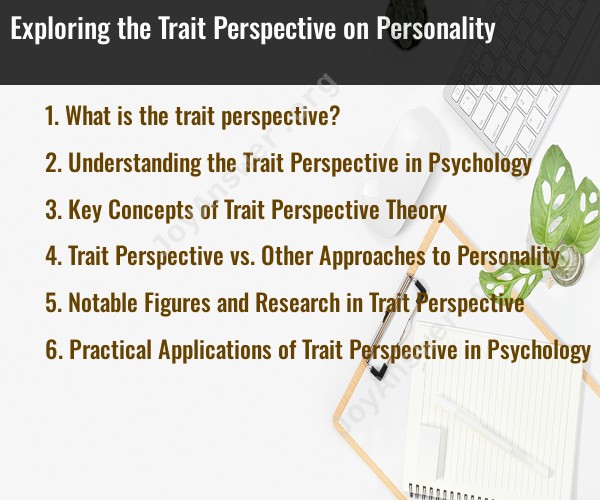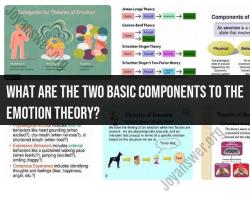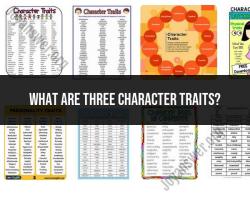What is the trait perspective?
The trait perspective is one of the major approaches in psychology used to study and understand personality. It focuses on identifying and categorizing the stable and enduring traits or characteristics that individuals possess, which influence their behavior, thoughts, and emotions. This perspective assumes that these personality traits remain relatively consistent over time and across different situations.
Key points about the trait perspective on personality include:
Trait Definition: Traits are stable patterns of behavior, thoughts, and feelings that are relatively consistent across various situations. Traits can be thought of as the building blocks of personality.
Trait Classification: Trait psychologists attempt to classify and describe these traits, often using factor analysis to identify the underlying dimensions of personality. For example, the Five-Factor Model (also known as the Big Five) is a well-known system that categorizes personality traits into five major dimensions: Openness, Conscientiousness, Extraversion, Agreeableness, and Neuroticism (often remembered by the acronym OCEAN).
Stability: The trait perspective suggests that personality traits are relatively stable over time, especially in adulthood. This means that your fundamental personality characteristics are likely to remain consistent throughout your life.
Individual Differences: The trait perspective emphasizes that people differ in the degree to which they possess certain traits. These individual differences in personality traits help explain why people have unique personalities and react differently to the same situations.
Predictive Power: Traits can be used to predict and understand behavior. For example, a person with high scores on the Conscientiousness trait is more likely to be organized, reliable, and diligent in their work.
Limitations: Critics of the trait perspective argue that it may oversimplify the complexity of human personality by reducing it to a set of traits. Human behavior and personality can be influenced by various situational factors and contextual variables, which may not be fully captured by trait descriptions.
Integration with Other Perspectives: The trait perspective is often integrated with other perspectives on personality, such as the psychodynamic, humanistic, and social-cognitive perspectives. This integration allows for a more comprehensive understanding of personality.
It's important to note that while the trait perspective provides valuable insights into personality, it is just one of many approaches used to study and understand human personality. Other approaches, such as the psychodynamic perspective (e.g., Freud's theory), focus on unconscious processes, while the humanistic perspective (e.g., Maslow's hierarchy of needs) emphasizes personal growth and self-actualization. The study of personality is a multidimensional field that benefits from a combination of these perspectives to provide a more comprehensive understanding of what makes each person unique.
Understanding the Trait Perspective in Psychology
The trait perspective in psychology is a theoretical approach that focuses on identifying, measuring, and understanding the stable and enduring characteristics that influence people's thoughts, feelings, and behaviors. These characteristics are known as personality traits. Trait theorists believe that traits are relatively stable over time and across situations, and they can be used to explain individual differences in personality.
Key Concepts of Trait Perspective Theory
The trait perspective in psychology is built on several key concepts:
Traits: Personality traits are the basic building blocks of personality. They are defined as relatively stable and enduring patterns of behavior, thought, and feeling that influence a person's interactions with the environment.
Individual Differences: Trait theorists believe that individuals differ from each other in their levels of specific traits. These differences can be measured using personality assessments.
Trait Hierarchies: Traits are often organized into hierarchies. Higher-order traits are more general and encompass lower-order traits, which are more specific.
Trait Consistency: Traits are relatively stable over time and across situations. However, they can also change to some extent due to life experiences and personal growth.
Trait Perspective vs. Other Approaches to Personality
The trait perspective is one of several major approaches to personality psychology. Other approaches include:
Psychoanalytic Perspective: Focuses on the unconscious mind and early childhood experiences.
Humanistic Perspective: Emphasizes free will, self-actualization, and positive growth.
Social-Cognitive Perspective: Focuses on how individuals learn and interact with their social environment.
The trait perspective differs from these other approaches in its focus on stable and enduring characteristics rather than unconscious processes, personal growth, or social learning.
Notable Figures and Research in Trait Perspective
Several notable figures have contributed to the development of the trait perspective in psychology, including:
Gordon Allport: One of the early pioneers of trait theory, Allport identified over 4,000 traits.
Hans Eysenck: Developed a three-factor model of personality, including extroversion-introversion, neuroticism-stability, and psychoticism-tough-mindedness.
Raymond Cattell: Developed the 16 Personality Factor Questionnaire (16PF), one of the most widely used personality assessments.
Robert McCrae and Paul Costa: Developed the Five-Factor Model of personality, which is the most widely accepted and researched model of personality today.
Practical Applications of Trait Perspective in Psychology
The trait perspective has a number of practical applications in psychology, including:
Personality Assessment: Trait theory provides a framework for developing and interpreting personality assessments, which are used in a variety of settings, such as clinical psychology, vocational counseling, and personnel selection.
Understanding Individual Differences: Trait theory helps us to understand why people differ from each other in their thoughts, feelings, and behaviors. This knowledge can be used to improve communication, relationships, and decision-making.
Prediction and Intervention: Trait theory can be used to predict how people will behave in certain situations. This information can be used to develop interventions to improve outcomes in areas such as education, mental health, and criminal justice.












